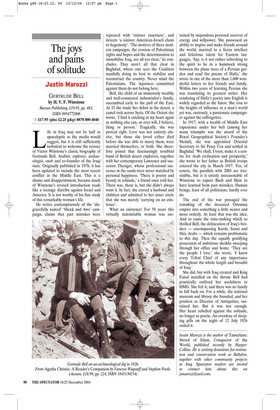The joys and pains of solitude
Justin Marozzi
GERTRUDE BELL by H. V. F. Winstone Barzan Publishing, £19.95, pp. 483, ISBN 0954772806 ✆ £17.95 (plus £2.25 p&p) 0870 800 4848 Life in Iraq may not be half as apocalyptic as the media would suggest, but it is still sufficiently turbulent to welcome the reissue of Victor Winstone’s classic biography of Gertrude Bell, Arabist, explorer, archaeologist, snob and co-founder of the Iraqi state. Originally published in 1978, it has been updated to include the most recent conflict in the Middle East. This is a shame and disappointment, because much of Winstone’s revised introduction reads like a teenage diatribe against Israel and America. It is not worthy of his fine study of this remarkable woman’s life.
He writes contemptuously of the ‘disgracefully named’ ‘Shock and Awe’ campaign, claims that past mistakes were repeated with ‘sinister exactness’, and detects ‘a sinister American-Israeli claim to hegemony’. ‘The motives of these modern campaigns, the erosion of Palestinian rights and hopes and the determination to immobilise Iraq, are all too clear,’ he concludes. They aren’t all that clear in Baghdad, where one sees the Coalition manfully doing its best to stabilise and reconstruct the country. Never mind the Palestinians. The injustices committed against them do not belong here.
Bell, the child of an immensely wealthy and well-connected industrialist’s family, succumbed early to the pull of the East. At 32 she made her debut in the desert, a camel trek across Syria. Of the Orient she wrote, ‘I find it catching at my heart again as nothing else can, or ever will, I believe, thing or person.’ Tragically, she was proved right. Love was not entirely elusive, but those she loved either died before she was able to marry them, were married themselves, or both. She therefore joined that fascinatingly troubled band of British desert explorers, together with her contemporary Lawrence and successor Thesiger, whose professional successes in the sands were never matched by personal happiness. ‘There is poetry and beauty in solitude,’ a friend once told her. There was, there is, but she didn’t always want it. In fact, she craved a husband and children and admitted to her inner circle that she was merely ‘carrying on an existence’.
What an existence! For 58 years this virtually indomitable woman was sus tained by stupendous personal reserves of energy and willpower. She possessed an ability to inspire and make friends around the world, married to a fierce intellect and felicitous talent for Eastern languages. ‘Say, is it not rather refreshing to the spirit to lie in a hammock strung between the plane trees of a Persian garden and read the poems of Hafiz,’ she wrote in one of the more than 1,600 wonderful letters to her friends and family. Within two years of learning Persian she was translating its greatest writer. Her rendering of Hafiz’s poetry into English is widely regarded as the finest. She rose to the heights of influence in a man’s world yet was, curiously, a passionate campaigner against the suffragettes.
In 1917, with a wealth of Middle East experience under her belt (among her many triumphs was the award of the Royal Geographical Society’s Founder’s Medal), she was appointed Oriental Secretary to Sir Percy Cox and settled in Baghdad. ‘We shall, I trust, make it a centre for Arab civilisation and prosperity,’ she wrote to her father as British troops entered the city in March 1917. Yes, of course, the parallels with 2003 are irresistible, but it is utterly unreasonable of Winstone to expect Bush and Blair to have learned from past mistakes. Human beings, least of all politicians, hardly ever do.
The end of the war presaged the remaking of the deceased Ottoman empire into something a little neater and more orderly. At least that was the idea. And so came the state-making which so thrilled Bell, the delineation of Iraq’s borders — encompassing Kurds, Sunni and Shia Arabs — which remains problematic to this day. Then the equally gratifying procession of ambitious sheikhs sweeping through her office and home. ‘They are the people I love,’ she wrote, ‘I know every Tribal Chief of any importance throughout the whole length and breadth of Iraq.’ She did, but with Iraq created and King Faisal installed on the throne Bell had practically outlived her usefulness to HMG. She felt it, and there was no family to fall back on. For a while, the national museum and library she founded, and her position as Director of Antiquities, sustained her. But it was not enough. Her heart rebelled against the solitude, no longer so poetic. An overdose of sleeping pills on the night of 12 July 1926 ended it.

















































































 Previous page
Previous page